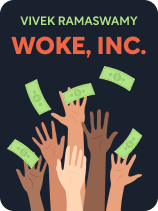

This article is an excerpt from the Shortform book guide to "Woke, Inc." by Vivek Ramaswamy. Shortform has the world's best summaries and analyses of books you should be reading.
Like this article? Sign up for a free trial here.
Looking for an overview of the Woke, Inc. book? What are the author’s key ideas and takeaways?
In the book Woke, Inc., entrepreneur Vivek Ramaswamy discusses what he calls Wokenomics, in which American corporations hide their corruption behind virtue signaling. He argues that Wokenomics goes beyond selling a product, rather selling Americans a new standard for the right way to think and live.
Read on for a brief overview of the key ideas and takeaways from the Woke, Inc. book.
Woke, Inc. by Ramaswamy: Book Overview
In his Woke, Inc. book, entrepreneur Vivek Ramaswamy argues that corporations have devised an elaborate scam: advertising a hollow fight for social justice in order to reap unprecedented profit and power. Ramaswamy calls this fusion of progressive ideals and capitalism “Wokenomics.” By engaging in Wokenomics, corporations go beyond selling a product; they are selling Americans a new standard for the right way to think and live. He contends that their false alliance with social causes allows them to influence legislation, manipulate consumers, and silence dissent. He argues that Wokenomics’s deceptive practices are weakening democracy—polarizing citizens and concentrating political power in the hands of a small group of corporate elites.
After graduating from Harvard and Yale, interning at infamous companies like Goldman Sachs, and founding his own biopharmaceutical company, Roivant Sciences, Ramaswamy claims he has personally witnessed the infiltration of Wokenomics and recounts his experiences in this book, Woke, Inc.
In this overview of the Woke, Inc. book, we’ll define woke and its development into the damaging Wokenomics that Ramaswamy alleges is detrimental to American democracy. Finally, we’ll detail the solutions Ramaswamy prescribes for an apolitical Wall Street.
What Is “Woke”?
In the Woke, Inc. book, Ramaswamy uses woke as the summation of all progressive politics, particularly ones regarding marginalized identities. However, the definition of woke has fluctuated over the years. Originally, the word woke was used exclusively in Black communities as a steady reminder to be alert to anti-Blackness, but it didn’t have any particular political affiliation. When the Black Lives Matter movement introduced woke to the mainstream, the use of the word expanded, and people on both sides of the political lines have difficulty agreeing on a precise definition. The meaning of woke ranges from being synonymous with an age of enlightenment (people awakening to the causes of inequity) to an insult of people who are oversensitive and self-important (cancel culture and political correctness often fall toward this end of the spectrum).
(Shortform Note: The Black Lives Matter (BLM) movement is a response to the accumulating cases of police brutality against Black Americans and began after the murder of George Floyd. Because demonstrations were so widespread and conducted largely through social media, premise numbers of participants are hard to pin down, but recent polls suggest that BLM is the largest civil rights protest in American history.)
| Moving Away From Woke Linguists indicate that when words broaden in definition, they often lose any real meaning. Ramaswamy frames woke as a term glorified by liberals, but many on the left also question its effectiveness in political discourse. Democratic political consultants like James Carville actively discourage politicians from using woke language in their campaigns as liberal constituents negatively associate the word with superficial change and conservatives automatically write off such policies as divisive. |
The Problem of Virtue Signaling
Ramaswamy’s main objection to wokeness in the Woke, Inc. book is that consumers come to believe that companies are actually invested in resolving social injustice when in reality, they’re engaging in disingenuous virtue signaling. Virtue signaling is a public demonstration of good character. For example, when a person volunteers at a charity event, they might post pictures of their service online for other people to see and to think of them as a good person. When an individual engages in virtue signaling, it may be self-serving but it doesn’t do much harm to others. However, when a company participates in virtue signaling, it’s a marketing ploy to take advantage of socially conscious consumers and can do harm to a considerably larger number of people.
By presenting as woke, companies attempt to accrue enough blind loyalty from consumers that they can distract them from scandal or controversy. For example, after the 2010 BP oil spill, woke consumers were unhappy with how environmentally irresponsible many companies were. Dawn dish soap began an ad campaign in response to the outrage, sending thousands of bottles down to the Gulf of Mexico and running commercials of baby ducks being saved by their product. Dawn became synonymous with wildlife protection efforts; little ducks still don their bottles a decade later. Ironically, Dawn dish soap is petroleum-based, and their company is part of the reason that we are so dependent on oil.
Ramaswamy asserts that once companies like Dawn create this noble reputation for themselves, consumers are not likely to investigate the company’s practices or policies further. The trust companies develop turns us into lazy citizens, simply accepting when companies say they are working in our best interest.
| Better Known as Woke-Washing Companies using virtue signaling is not new. Eighteenth-century economist and philosopher Adam Smith claimed that virtue signaling becomes necessary as the market grows. When people rely on several different businesses to provide goods and services, it’s not feasible for consumers to deeply evaluate the merit of each one—from the quality of their products to the ethics of their practices. Instead, consumers can search for particular indicators. For example, the Better Business Bureau (BBB) rates a business’s trustworthiness. If a business gets accredited by the BBB, then consumers know the company has met certain standards and requirements. If a business advertises that the BBB gave them a high rating to garner customers’ trust, this is a form of virtue signaling. The problem with using wokeness as virtue signaling is that the concept of woke is so loosely defined and there are no standards for companies to uphold. They can do as little as send a tweet or as much as start their own charities, but both would be considered woke. Social activists already have a term for this specific combination of woke businesses and virtue signaling. “Woke-washing” is when companies champion social causes while contributing to no meaningful change, or worse, actively making social inequities worse. To contend with woke-washing, advocates hold hypocritical companies accountable through social media and raise awareness through services like the Anti-Racism Daily and BuyPartisan on more productive ways to promote change. |
The Problems With Wokenomics
Ramaswamy writes that a company engaging in any way with progressive values is woke and strays from his ideal of apolitical capitalism. The Woke, Inc. book highlights what he contends are the worst ways that Wokenomics is applied to American society, including diversity training and censorship, boycotting, and submitting to foreign, undemocratic countries.
Diversity Training and Censorship
Ramaswamy contends that diversity training is a way for a company to inflate its efforts of making internal changes while never having to implement any actual practices. These trainings often teach about sexual harassment, LBGTQ+ inclusion, or anti-racist practices. While they may have some educational value for employees, they do not guarantee that the company will hire more marginalized identities, create safe spaces for them, nor donate to related causes.
(Shortform note: To be clear, Ramaswamy isn’t suggesting that companies reconcile this disconnect between what they say they do and what they actually do by changing their actual hiring practices and inclusion policies. His argument is that such policies are unnecessary because prioritizing a workforce of diverse identities isn’t needed to make a company successful. He recommends, instead, that they simply stop pretending they’re making these changes.)
Submitting to Foreign Countries
According to Ramaswamy’s Woke, Inc. book, the deceptive nature of Wokenomics amplifies the corruption between American corporations and foreign governments. In global capitalism, companies often seek to maximize their profits by partnering with countries that have fewer regulations on valuable resources like raw materials and labor. Ramaswamy argues that Wokenomics distracts consumers from these unethical partnerships.
When buying from woke companies, consumers believe they’re supporting an advocate for human rights, but Wokenomics doesn’t compel companies to be transparent about their overseas dealings. Ramaswamy argues that because Wokenomics creates trust between the company and the consumer, customers may not be motivated to investigate a business’s international practices if they already believe the company to be morally sound.
Woke companies’ dishonest conduct, therefore, leads to many consumers unknowingly supporting actions that contradict the very ideas they believe in. For example, even though Starbucks advertised its socially responsible mission statement and anti-racist training programs, it has five plantations in Brazil that use child and slave labor under dismal working conditions.
| Forgetting a Company’s Misdeeds Studies show that consumers remember ethical corporate behavior better than unethical behavior. When it comes to the news or personal memories, people tend to retain negative information better, but researchers hypothesize that people retain positive memories of companies because they prefer to ignore negative behavior that might conflict with their desire to buy a product or spend their leisure time without thinking about serious, political issues. Woke companies can use this tendency to their advantage. The average American consumer isn’t up-to-date on international news, and if controversy does surface, companies can drown it out with reports of all of their good deeds until most people forget the scandals. |

———End of Preview———
Like what you just read? Read the rest of the world's best book summary and analysis of Vivek Ramaswamy's "Woke, Inc." at Shortform.
Here's what you'll find in our full Woke, Inc. summary:
- Tactics companies use to influence legislation and manipulate consumers
- How "Wokenomics" is weakening democracy
- Five solutions to counter wokeness






